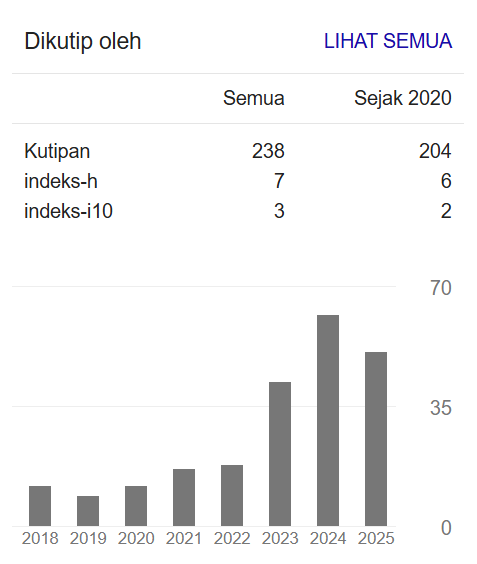A STUDY OF JOHN WANSBROUGH THOUGHTS ON QUR’ANIC STUDIES
SOURCE AND METHODS OF SCRIPTURAL INTERPRETATION
DOI:
https://doi.org/10.20871/tjsq.v6i1.304Keywords:
Historical, Literary Analysis, Methodology, Orientalist, Study Qur’an, WansbroughAbstract
The study of Islam, particularly Quranic studies, has been shaped by various methodologies and interpretations introduced by Western scholars. Among them, John Wansbrough’s provocative insights in his methodological approach stand out. Wansbrough’s historical and literary analysis challenges traditional views by proposing that the Quran is a product of cultural evolution and influence. This article delves into Wansbrough’s perspective, focusing on his work ‘The Quranic Studies: Sources and Methods of Scriptural Interpretation.’ This study reveals Wansbrough’s arguments about the possibility of Jewish-Christian traditions in the Quran, the role of cultural contexts, and the evolution of the Quranic text. Wansbrough’s methods, including historical scepticism and literary analysis, have triggered both support and criticism. Wansbrough suggests that sacred texts, such as the Quran, may consist of different layers and undergo changes and revisions over time, especially due to cultural, political, and social influences. Although some scholars view Wansbrough’s methods as too sceptical and controversial, others consider them to provide valuable insights into the history and development of sacred texts. Scholars such as Fazlur Rahman have criticized Wansbrough’s theories, defending traditional views. However, supporters argue that Wansbrough’s ideas expand the boundaries of Quranic studies. Ultimately, this article explores and demonstrates open and critical discussions within the realm of Islamic studies, acknowledging various perspectives to achieve a deeper understanding of the complex origins and interpretations of the Quran. This research uses a qualitative approach and literature analysis to understand John Wansbrough’s thinking. Open and critical discussions are necessary for Islamic studies to understand the various perspectives and methods in uncovering the meaning of the Quran and the history of Islam.
Downloads
References
‘Abduh, Muḥammad. Risālah al-Tawhīd. Mesir: Al-Manār, 1955.
Agustono, Ihwan. ‘Karakteristik Kesarjanaan Barat Kontemporer dalam Studi Al Qur’an’. Dissertation, UIN Sunan Ampel Surabaya, 2018. http://digilib.uinsa.ac.id/28026/.
Alwi, Muhammad. ‘Kritik Atas Pandangan William M. Watt Terhadap Sejarah Penulisan Al-Qur’an’. Jurnal Studi Ilmu-Ilmu Al-Qur’an dan Hadis 21, no. 1 (30 January 2020): 89–110. https://doi.org/10.14421/qh.2020.2101-05.
Amal, Taufik Adnan. ‘Al-Qur’an di Mata Barat Kajian Baru John Wansbrough’. Ulumul Qur’an Jurnal Ilmu dan Kebudayaan 4, no. 1 (1990).
Bell, Richard. ‘The Qur'an.’ In The Oxford Handbook of Islamic Theology, edited by Sabine Schmidtke. Oxford: Oxford University Press, 2016.
Berg, Herbert. ‘The Implications of, and Opposition to, the Methods and Theories of John Wansbrough’. Method & Theory in the Study of Religion 9, no. 1 (1997): 3–22.
Brown, Jonathan. Misquoting Muhammad: The Challenge and Choices of Interpreting the Prophet’s Legacy. London: Oneworld Publications, 2014.
Ghazali, L. A. Abd Moqsith, and U. Abshar-Abdalla. ‘Meodologi Studi Al-Qur’an.’ PT Gramedia Pustaka Utama, 2009.
Ghozali, Ahmad, and Muhammad Azka Noor. ‘Epistemologi Pemikiran Andrew Rippin dan Implikasinya Terhadap Fungsi Asbabun Nuzul (Analisis Atas Artikel The Function of Asbab An-Nuzul in Qur’anic Exegesis)’. Mafatih 2, no. 1 (29 June 2022): 84–95. https://doi.org/10.24260/mafatih.v2i1.806.
Goldziher, Ignaz. Muslim Studies (Muhammedanische Studien). Vol. 2. Translated by C.P. Barber and S.M. Stern. New York: Atherton, 1971.
Hasbiyallah, Muhammad. ‘Paradigma Tafsir Kontekstual: Upaya Membumikan Nilai-Nilai Al-Qur’an’. Al-Dzikra: Jurnal Studi Ilmu Al-Qur’an dan Al-Hadits 12, no. 1 (30 August 2018): 1–26. https://doi.org/10.24042/al-dzikra.v12i1.2924.
Ibrahim, Sulaiman. ‘Sejarah Teks Al-Qur’an: Studi Atas Pemikiran John Wansbrough.’ Jurnal Farabi 13, no. 2 (2016): 187–207.
Masrur, Ali. ‘Neo-Skeptisisme Michael Cook dan Norman Calder Terhadap Hadis Nabi Muhammad’. Jurnal Theologia 28, no. 1 (14 September 2017): 1–28. https://doi.org/10.21580/teo.2017.28.1.1188.
Pransiska, Toni. ‘Meneropong Wajah Studi Islam dalam Kacamata Filsafat: Sebuah Pendekatan Alternatif’. Intizar 23, no. 1 (19 December 2017): 163–82. https://doi.org/10.19109/intizar.v23i1.1270.
Rahman, Fazlur. ‘Historical versus Literary Criticism’. In An Anthology of Islamic Studies, edited by Issa J. Boullata. Canada: McGill Indonesia IAIN Development Project, 1992.
———. Major Theme of the Qur’an. Chicago: Biblioteka Islamica, 1989.
Rippin, Andrew. ‘Literary of al-Qur’an and Sira the Methodology of John Wansbrough.’ In Approaches to Religious Studies, edited by Richard C. Martin. USA: The University of Arizona Press, 1985.
Schacht, Joseph. The Origins of Muhammadan Jurisprudence. Oxford: Clarendon Press, 1950.
Suryadilaga, Muhammad Alfatih. ‘Kajian Atas Pemikiran John Wansbrough Tentang Al-Qur’an dan Nabi Muhammad’. Tsaqafah 7, no. 1 (31 May 2011): 89–108. https://doi.org/10.21111/tsaqafah.v7i1.109.
Wansbrough, John. Quranic Studies: Source and Methods of Scriptural Interpretation. Oxford: Oxford University Press, 1977.
Wathani, Syamsul. ‘John Wansbrough: Studi Atas Tradisi dan Instrumen Tafsir Alqur’an Klasik’. Al-A’raf : Jurnal Pemikiran Islam dan Filsafat 15, no. 2 (31 December 2018): 295–314. https://doi.org/10.22515/ajpif.v15i2.1247.
Watt, W. Montgomery. Bell’s Introduction to the Quran. Edinburgh: Edinburgh University Press, 1970.
Welch, Alford T. ‘Qur’anic Studies: Problems and Prospects’. Journal of the American Academy of Religion 47 (1980): 620–634.
Yusup, Asdar. ‘Metode Bibel dalam Pemaknaan Al-Qur’an (Kajian Kritis Terhadap Pandangan Orientalis)’. Hunafa: Jurnal Studia Islamika 13, no. 1 (20 July 2016): 35–65. https://doi.org/10.24239/jsi.v13i1.413.35-65.
Zarkasyi, Hamid Fahmy. ‘Tradisi Orientalisme dan Framework Studi Al-Qur’an’. Tsaqafah 7, no. 1 (31 May 2011): 1–30. https://doi.org/10.21111/tsaqafah.v7i1.105.
Downloads
Published
How to Cite
Issue
Section
License
Copyright (c) 2023 Author

This work is licensed under a Creative Commons Attribution 4.0 International License.






















